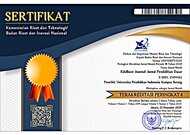Learning Transformation in the Post-Pandemic Era: Synergy of Teacher and Parent Collaboration in Elementary Schools
Abstract
Changes in educational paradigms and practices after the COVID-19 pandemic are a reflection of educational improvements, examples of good practices, and predictions for the future. This research aims to investigate learning transformation in the post-COVID-19 pandemic era, focusing on the synergy of collaboration between teachers and parents at the elementary school level. The research method used was descriptive qualitative using an elementary school case study method. The research subjects involved teachers and parents of fifth-grade students at the State Elementary School of Wanasari 05 Cibitung Sub-district, who were involved in collaborative efforts. The data collection instruments in this research were interviews and observation. The data obtained would be analyzed using the Miles and Huberman model, with a data analysis process that included data reduction, where the data obtained was compiled, selected, and focused on aspects relevant to the research objectives. The research results demonstrated a transformation in post-pandemic learning approaches, especially through collaboration between teachers and parents. These collaborative practices covered strategies such as regular meetings and utilizing communication technology. It was also found that the synergy between teachers and parents positively impacted the quality of student learning, particularly in terms of motivation, understanding of the material, and social support.
Keywords
Full Text:
PDFReferences
Al-Ansi, A. M., & Al-Ansi, A. (2020). Future of education post covid-19 pandemic: Reviewing changes in learning environments and latest trends. Solid Statе Tеchnology, 63(6), 201584–201600.
Azhari, S. C., Rosali, E. S., Amalia, M., Rismawati, R., Yuniarti, T., Zahra, Z., & Ningrat, S. R. (2022). A systematic literature review: The role of teachers and parents in online learning in Indonesia. Journal on Teacher Education, 3(3), 11–20.
Birhan, W., Shiferaw, G., Amsalu, A., Tamiru, M., & Tiruye, H. (2021). Exploring the context of teaching character education to children in preprimary and primary schools. Social Sciences and Humanities Open, 4(1), 100171.
Buchanan, K. S., & Buchanan, T. D. (2019). Preparing teacher candidates to collaborate with families and communities: Standards, research, and practice. Northwest Journal of Teacher Education, 14(1), 1–19.
Chanana, N., & Sangeeta, S. (2021). Employee engagement practices during COVID-19 lockdown. Journal of Public Affairs, 21(4), e2508.
Fansury, A. H., Januarty, R., Rahman, A. W., & Syawal, S. (2020). Digital content for millennial generations: Teaching the English foreign language learner on COVID-19 pandemic. Journal of Southwest Jiaotong University, 55(3), 1–12.
Farooq, M. S., & Asim, I. (2020). Parental involvement as predictor for self-regulated learning and academic achievement of students at secondary school level. Journal of Educational Sciences & Research, 7(1), 14–32.
Febrianto, P. T., Mas’udah, S., & Megasari, L. A. (2020). Implementation of online learning during the COVID-19 pandemic on Madura Island, Indonesia. International Journal of Learning, Teaching and Educational Research, 19(8), 233–254.
Ferri, F., Grifoni, P., & Guzzo, T. (2020). Online learning and emergency remote teaching: Opportunities and challenges in emergency situations. Societies, 10(4), 1–18.
Guan, A. G. R., & Benavides, N. G. (2021). Parent-teacher-learner collaboration in facilitating modular instruction. United International Journal for Research & Technology, 2(7), 80–89.
Hasanah, U., Alizamar, A., Marjohan, M., & Engkizar, E. (2019). The effect of self-efficacy and parent support on learning motivation in management business students in Padang’s private vocational school. KONSELI : Jurnal Bimbingan dan Konseling, 6(2), 133–140.
Kim, J. (2020). Learning and teaching online during covid-19: Experiences of student teachers in an early childhood education practicum. International Journal of Early Childhood, 52(2), 145–158.
Kong, S. C., & Wang, Y. Q. (2021). The influence of parental support and perceived usefulness on students’ learning motivation and flow experience in visual programming: Investigation from a parent perspective. British Journal of Educational Technology, 52(4), 1749–1770.
Lapitan, L. D., Tiangco, C. E., Sumalinog, D. A. G., Sabarillo, N. S., & Diaz, J. M. (2021). An effective blended online teaching and learning strategy during the COVID-19 pandemic. Education for Chemical Engineers, 35, 116–131.
Limiansia, K., Pratama, A. T., & Anazifa, R. D. (2020). Transformation in biology learning during the covid-19 pandemic: From offline to online. Scientiae Educatia: Jurnal Pendidikan Sains, 9(2), 189–202.
Lubis, A. H., & Lubis, Z. (2020). Parent’s perceptions on e-learning during covid-19 pandemic in Indonesia. Journal of Critical Reviews, 7(18), 3599–3607.
Many, J. E., Bhatnagar, R., & Tanguay, C. L. (2022). Disruption, transition, and re-imagining: Teaching, learning and development in the midst of the two pandemics. International Journal on Social and Education Sciences, 4(3), 423–445.
Matthes, J., Thomas, M. F., Stevic, A., & Schmuck, D. (2021). Fighting over smartphones? Parents’ excessive smartphone use, lack of control over children’s use, and conflict. Computers in Human Behavior, 116(2), 106618.
Moorhouse, B. L., Li, Y., & Walsh, S. (2023). E-classroom interactional competencies: Mediating and assisting language learning during synchronous online lessons. RELC Journal, 54(1), 114–128.
Muñoz, J. L. R., Ojeda, F. M., Jurado, D. L. A., Peña, P. F. P., Carranza, C. P. M., Berríos, H. Q., Molina, S. U., Farfan, A. R. M., Arias-Gonzáles, J. L., & Vasquez-Pauca, M. J. (2022). Systematic review of adaptive learning technology for learning in higher education. Eurasian Journal of Educational Research, 98, 221–233.
Park, S., & Weng, W. (2020). The relationship between ICT-related factors and student academic achievement and the moderating effect of country economic index across 39 countries: Using multilevel structural equation modelling. Technology & Society, 23(3), 1–15.
Raccah, A. A., & Tamir, N. (2022). Mothers as teachers to their children: lessons learned during the COVID-19 pandemic. Journal of Family Studies, 29(4), 1–24.
Rawashdeh, A. Z. A. Mohammed, E. Y., Al Arab, A. R., Alara, M., Al-Rawashdeh, B., & Al-Rawashdeh, B. (2021). Advantages and disadvantages of using e-learning in university education: Analyzing students’ perspectives. Electronic Journal of E-Learning, 19(3), 107–117.
Ribeiro, L. M., Cunha, R. S., Silva, M. C. A., Carvalho, M., & Vital, M. L. (2021). Parental involvement during pandemic times: Challenges and opportunities. Education Sciences, 11(6), 1–17.
Rizaldi, D. R., Nurhayati, E., Fatimah, Z., & Amni, Z. (2022). The importance of parental assistance in supervising the use of technology for children during the home learning program. International Journal of Engineering, Science and Information Technology, 1(3), 7–10.
Sethi, J., & Scales, P. C. (2020). Developmental relationships and school success: how teachers, parents, and friends affect educational outcomes and what actions students say matter most. Contemporary Educational Psychology, 63(2), 101904.
Sinaga, L. A. F. S., Siburian, P., Purba, S., & Siburian, P. (2019). Development of a parent engagement learning model through suggestion box and a corner of pouring of students heart in public junior school at Binjai. Advances in Social Science, Education and Humanities Research, 384, 100–104.
Waruwu, N., Arifin, F., & Hady, Y. (2023). The implementation of post-pandemic blended learning in elementary schools. Tafkir: Interdisciplinary Journal of Islamic Education, 4(3), 446–457.
DOI: https://doi.org/10.17509/ebj.v5i2.64031
Refbacks
- There are currently no refbacks.
Copyright (c) 2023 Universitas Pendidikan Indonesia
This work is licensed under a Creative Commons Attribution 4.0 International License.
This journal is indexed by




.png)




.png)
1.png)


1.png)

.png)